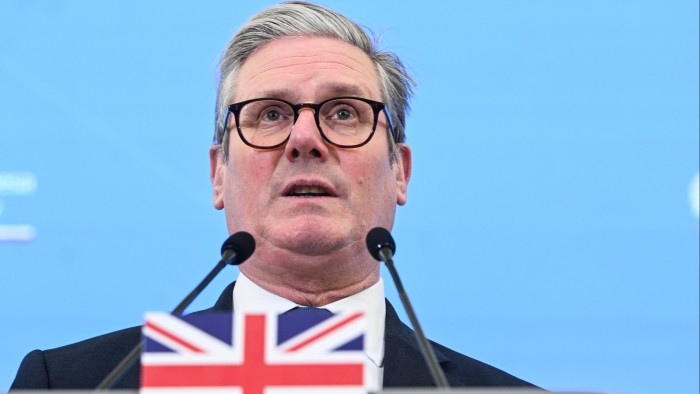This article is an on-site version of our Inside Politics newsletter. Subscribers can sign up here to get the newsletter delivered every weekday. If you’re not a subscriber, you can still receive the newsletter free for 30 days
Good morning. This isn’t a US politics newsletter — sign up to the excellent White House Watch for all of that — but British politics will, inevitably, be hugely shaped by Donald Trump’s second term as president. That poses political risks and opportunities to the UK’s main parties — as discussed below.
Inside Politics is edited by Georgina Quach. Read the previous edition of the newsletter here. Please send gossip, thoughts and feedback to insidepolitics@ft.com
The times they are a-changing
The big risk to the Labour government from a Trump presidency is simple: that his actions have negative consequences for the British economy and/or the government’s finances. We saw how that could play out in the UK gilts market last week, but it could also mean that the government ends up having to spend far more on defence. That could all unfold in ways that make the government unpopular.
The government’s official line is that the US-UK relationship is strong and it will all be fine, but, of course, that’s because there is no other tenable “official” line. The British government finds itself in an odd position, where Trump’s remarks about Canada and Greenland are, for all the reasons Gideon Rachman set out in a brilliant column, highly alarming.
But thus far London is not in a direct confrontation with Trump. Some of the things he has said since the election, not least his willingness to ride to the rescue of TikTok, may mean that some possible flashpoints, like the UK government’s relatively meagre list of tariffs on China compared with its peers, are not as big a problem as thought.
The risk to the Conservatives and the Reform UK party is different and more complex. For Reform, it is that it is seen as close to the US president, and that it is pretty much maxed out when it comes to attracting “British voters who like Donald Trump”. The perception of proximity to Trump may be a help to Nigel Farage when it comes to raising money but hurt when it comes to winning people over. For Kemi Badenoch’s Conservatives, on top of that, it all deepens the perception that her party is just a weak echo of Farage’s Reform rather than having a distinctive pitch of its own.
For the SNP, the Greens and Plaid Cymru the politics of this are rather easy: it’s a way that they can criticise Labour for being insufficiently principled. I have a feeling that it is trickier for the Liberal Democrats: I think some of the voters they won from the Conservatives last time and some 2024 Tory voters who might be up for grabs care a bit about the Lib Dems looking “credible”, ie having a foreign policy position that might actually be deliverable. That’s the balance Ed Davey is trying to tread with positions such as his call for the UK to re-enter the customs union. It’s difficult, but nowhere near as difficult as the one that Keir Starmer faces from now on.
Join my FT colleagues on Thursday at 1pm GMT for a free webinar on Trump’s second term. Register here and put questions to the panel. And in case you missed it, read the latest special edition of FirstFT Americas, where reporters answered some of our newsletter subscribers’ questions on specific policy areas.
Now try this
I saw A Complete Unknown on Friday — what I will say is that I think Timothée Chalamet is very good as Bob Dylan, Edward Norton masterful as Pete Seeger and if you go expecting to see a beautifully shot movie with some terrific Dylan songs you’ll have a great time. But if you’re a Dylanologist you’ll find it frustratingly shallow and even more so if you are also interested in Joan Baez or any of the substantial divides between these two musicians. The best way to put it is that in the cinema I loved it, on the train home I found it disappointing, but by Saturday morning I was making plans to see it again. Danny Leigh’s review is here.
Top stories today
-
‘Let’s revisit this’ | The UK government is seeking compromises on parts of its landmark workers’ rights legislation as employers redouble calls for changes to some of its more contentious elements to remove obstacles to economic growth.
-
Peer fear | A surge in UK health-related benefit claimants has been caused by design flaws in the welfare system, not by worsening health outcomes or long waits for treatment, a committee of peers has said.
-
Schools bill | Labour’s proposals to reform the English schools system, including a reduction in freedoms enjoyed by academies, has been sharply criticised by opposition Conservatives and some academy trust heads. This explainer lays out the proposed changes and the reception so far.
-
Russell up severance | More than a third of elite UK universities were forced to make further staff cuts last year, while severance spending across the Russell Group rose by more than a fifth. FT analysis of financial statements also found that collectively 22 Russell Group universities paid £70mn last academic year.
-
‘Ignore the noises off’ | Starmer said he could strike a trade deal with Donald Trump and avoid punitive tariffs on the UK as he dismissed as “noises off” Elon Musk’s criticism of his leadership.



